
otto-m8
Flowchart-like UI to interconnect LLM's and Huggingface models, and deploy them as a REST API with little to no code.
Stars: 65
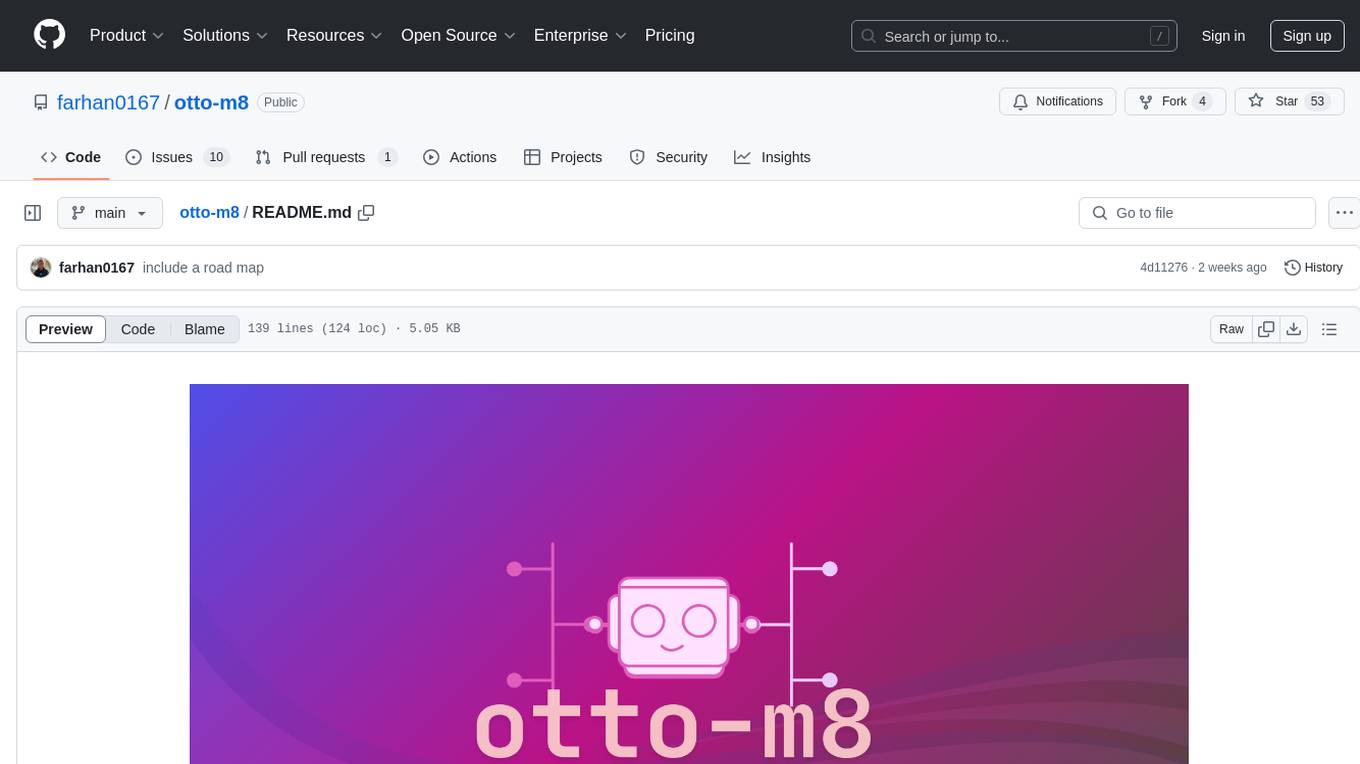
otto-m8 is a flowchart based automation platform designed to run deep learning workloads with minimal to no code. It provides a user-friendly interface to spin up a wide range of AI models, including traditional deep learning models and large language models. The tool deploys Docker containers of workflows as APIs for integration with existing workflows, building AI chatbots, or standalone applications. Otto-m8 operates on an Input, Process, Output paradigm, simplifying the process of running AI models into a flowchart-like UI.
README:
An open source Flowchart based automation platform to run deep learning workloads with minimal to no code.
otto-m8 (automate) is a low code platform that allows users to build AI/ML workflows through a flowchart like UI. In other words, you can visually declare how you build AI workflows or agents. Its low code because you are still in control over the implementation of a block(yes you can not only add custom blocks but also modify out of the box blocks), and more importantly, its a platform that isn't specifically built on top of an existing AI framework like Langchain. What this means is that, you can build you workflows with any framework you see fit, whether it is Langchain, Llama Index or the AI providers sdk themselves.
At its core, otto-m8 views the problem of building any AI workflow as a graph problem. As developers, we mostly build modular components where each components are responsible for a specific task (consider them as nodes), and each component sends data between each other (the edges). Together you get a workflow which consists of inputs, some transformations of the inputs(we'll call them processes), and an output.
This project is still in its early phase. What will make this platform successful is the number of integrations we can provide, but more than that, what will make this project successful is if we can circumvent the limitations of low code platforms, which is-they don't scale. To overcome this, otto-m8 is released as a fully open source platform and community contributions will be greatly appreciated. For contributions, see the CONTRIBUTION.md for guidelines.
- Build AI/ML workflows visually through out of the box blocks and by interconnecting them.
- Build custom blocks or extend existing ones through code.
- Incrementally build your workflows with instant feedback loops before deploying.
- Deploy your workflows to get a Docker container that serves your workflow as a REST API.
- Keep a trace of every workflow run of your deployed workflows.
[!IMPORTANT] Breaking changes:
- This project is still in its early development phase and as a result changes will be pushed that can break your existing workflows.
- Clone the repository
git clone https://github.com/farhan0167/otto-m8.git cd otto-m8/ - Make sure to have Docker or Docker Desktop Installed on your computer.
- In order to run Ollama blocks, make sure you have the Ollama server running in the background.
-
Run the following command to make
run.shexecutablechmod +x run.sh
-
Lauching the application Once the script has the right permissions, you'll then need to run the
run.shscript. This script will build all the necessary docker containers, including that of the frontend and backend. Since the server is hosted on a docker container, in order to deploy workflow containers, you'll need to mount your docker daemon to the server container which will allow the server to launch containers. You will therefore have two ways to launch:-
Without mounting the docker daemon. This will mean that you won't be able to deploy your workflows as a docker container but you can still interact with it(build workflows and testing them). Similarly, you won't be able to launch Lambdas but you should still be able to modify or create custom blocks. To run:
./run.sh
-
Mounting the docker daemon. This will mean that you will be able to deploy your workflows as docker containers and similarly be able to launch Lambdas. To run:
./run.sh --launch-containers
-
Without mounting the docker daemon. This will mean that you won't be able to deploy your workflows as a docker container but you can still interact with it(build workflows and testing them). Similarly, you won't be able to launch Lambdas but you should still be able to modify or create custom blocks. To run:
-
This script should launch all the containers necessary to get started with otto-m8. You can start interacting with the platform by heading to
http://localhost:3000, once the FastAPI server started completely. You should look at something like this in your logs:Otto Dashboard URL: http://localhost:3000 Otto Server URL: http://localhost:8000 INFO: Will watch for changes in these directories: ['/app'] INFO: Uvicorn running on http://0.0.0.0:8000 (Press CTRL+C to quit) INFO: Started reloader process [1] using StatReload INFO: Started server process [13] INFO: Waiting for application startup. INFO: Application startup complete. -
Debugging common issues:
Error getting credentials
This error is typically related to Docker credentials, and would look something like this:
error getting credentials - err: exit status 1, out: `` Building slim base image... [+] Building 0.2s (1/2) docker:desktop-linux [+] Building 0.2s (2/2) FINISHED docker:desktop-linux => [internal] load build definition from slim-base.Dockerfile 0.0s => => transferring dockerfile: 95B 0.0s => ERROR [internal] load metadata for docker.io/library/python:3.11.4-sl 0.2st ------ > [internal] load metadata for docker.io/library/python:3.11.4-slim: ------ slim-base.Dockerfile:1 -------------------- 1 | >>> FROM python:3.11.4-slim 2 | 3 | RUN pip install otto-m8 -------------------- ERROR: failed to solve: python:3.11.4-slim: failed to resolve source metadata for docker.io/library/python:3.11.4-slim: error getting credentials - err: exit status 1, out: ``To solve this simply run
rm ~/.docker/config.jsonas mention in this post.
Please see here for full documentation, including:
- Introduction: Overview of the platform
- Conceptual-Guide: The core concepts that went behind building otto-m8
- Tutorials: If you want to see what you can build with otto-m8, this guide is what you're looking for.
Below is an example of a workflow that incorporates Langchain's PDF Parser to build a workflow:

- Install the library:
pip install otto-m8
- And then run:
import base64
import json
from otto_m8.run import OttoRun
# Assuming your workflow is running on port 8001
otto = OttoRun(workflow_url='http://localhost:8001/workflow_run')
path_to_pdf = "./AMZN-Q1-2024-Earnings-Release.pdf"
# Any kind of upload documents expect a base64 encoded string.
with open(path_to_pdf, "rb") as f:
data = f.read()
data_base64 = base64.b64encode(data).decode("utf-8")
# Based on the Block's displayed name(`id` on Block config tab), append your data:
payload = {
"Langchain_PDF_Parser": data_base64,
"Input_Block": "What was amazon's net sales?"
}
response = otto.run(payload)
print(response)import requests
import base64
import json
# Find the deployment URL on the Template page
deployment_url = "http://localhost:8001/workflow_run"
path_to_pdf = "./AMZN-Q1-2024-Earnings-Release.pdf"
# Any kind of upload documents expect a base64 encoded string.
with open(path_to_pdf, "rb") as f:
data = f.read()
data_base64 = base64.b64encode(data).decode("utf-8")
# Based on the Block's displayed name(`id` on Block config tab), append your data:
payload = {
"Langchain_PDF_Parser": data_base64,
"Input_Block": "What was amazon's net sales?"
}
request = requests.post(
deployment_url,
json={"data": payload}
)
response = request.json()['message']
response = json.loads(response)
print(response)Output:
"""
{
"f92cffae-14d2-43f4-a961-2fcd5829f1bc": {
"id": "chatcmpl-AgOrZExPgef0TzHVGNVJJr1vmrJyR",
"choices": [
{
"finish_reason": "stop",
"index": 0,
"logprobs": null,
"message": {
"content": "In the first quarter of 2024, Amazon's net sales increased by 13% to $143.3 billion, compared with $127.4 billion in the first quarter of 2023.",
"refusal": null,
"role": "assistant",
"function_call": null,
"tool_calls": null
}
}
],
"created": 1734668713,
"model": "gpt-4o-mini-2024-07-18",
"object": "chat.completion",
"service_tier": null,
"system_fingerprint": "fp_0aa8d3e20b",
"usage": {
"completion_tokens": 42,
"prompt_tokens": 13945,
"total_tokens": 13987,
"completion_tokens_details": {
"audio_tokens": 0,
"reasoning_tokens": 0,
"accepted_prediction_tokens": 0,
"rejected_prediction_tokens": 0
},
"prompt_tokens_details": {
"audio_tokens": 0,
"cached_tokens": 13824
}
},
"conversation": [
{
"role": "user",
"content": "What was amazon's net sales?"
},
{
"role": "assistant",
"content": "In the first quarter .."
}
]
}
}
"""Use the Chat Output block to use the chat interface:

You can run almost any Huggingface model(although not really) that can be run via
Huggingface's pipeline abstraction. Below is a simple demo of the Salesforce/blip-image-captioning-base model.

- [x] Basic Chatbot and HF workflows
- [x] Function Calling
- [x] Lambda Functions/ Custom Code blocks
- [x] Multimodality for Huggingface
- [ ] Multimodality for OpenAI
- [x] SDK for interacting with deployed workflows
- [x] Observability for every block's output like a Logger
- [ ] Memory for Chatbot and RAG. Goal is to not clutter the drawing board.
- [x] Streamline workflow creation, edits and redeployment. Some form of version control
- [x] Apart from Lambdas that deploy seperate docker containers for custom code, build a custom code block which is deployed within the workflow container.
- [ ] ML Model Training via UI?
This project is licensed under the Apache 2.0 License - see the LICENSE file for details.
For Tasks:
Click tags to check more tools for each tasksFor Jobs:
Alternative AI tools for otto-m8
Similar Open Source Tools

otto-m8
otto-m8 is a flowchart based automation platform designed to run deep learning workloads with minimal to no code. It provides a user-friendly interface to spin up a wide range of AI models, including traditional deep learning models and large language models. The tool deploys Docker containers of workflows as APIs for integration with existing workflows, building AI chatbots, or standalone applications. Otto-m8 operates on an Input, Process, Output paradigm, simplifying the process of running AI models into a flowchart-like UI.

chat-mcp
A Cross-Platform Interface for Large Language Models (LLMs) utilizing the Model Context Protocol (MCP) to connect and interact with various LLMs. The desktop app, built on Electron, ensures compatibility across Linux, macOS, and Windows. It simplifies understanding MCP principles, facilitates testing of multiple servers and LLMs, and supports dynamic LLM configuration and multi-client management. The UI can be extracted for web use, ensuring consistency across web and desktop versions.
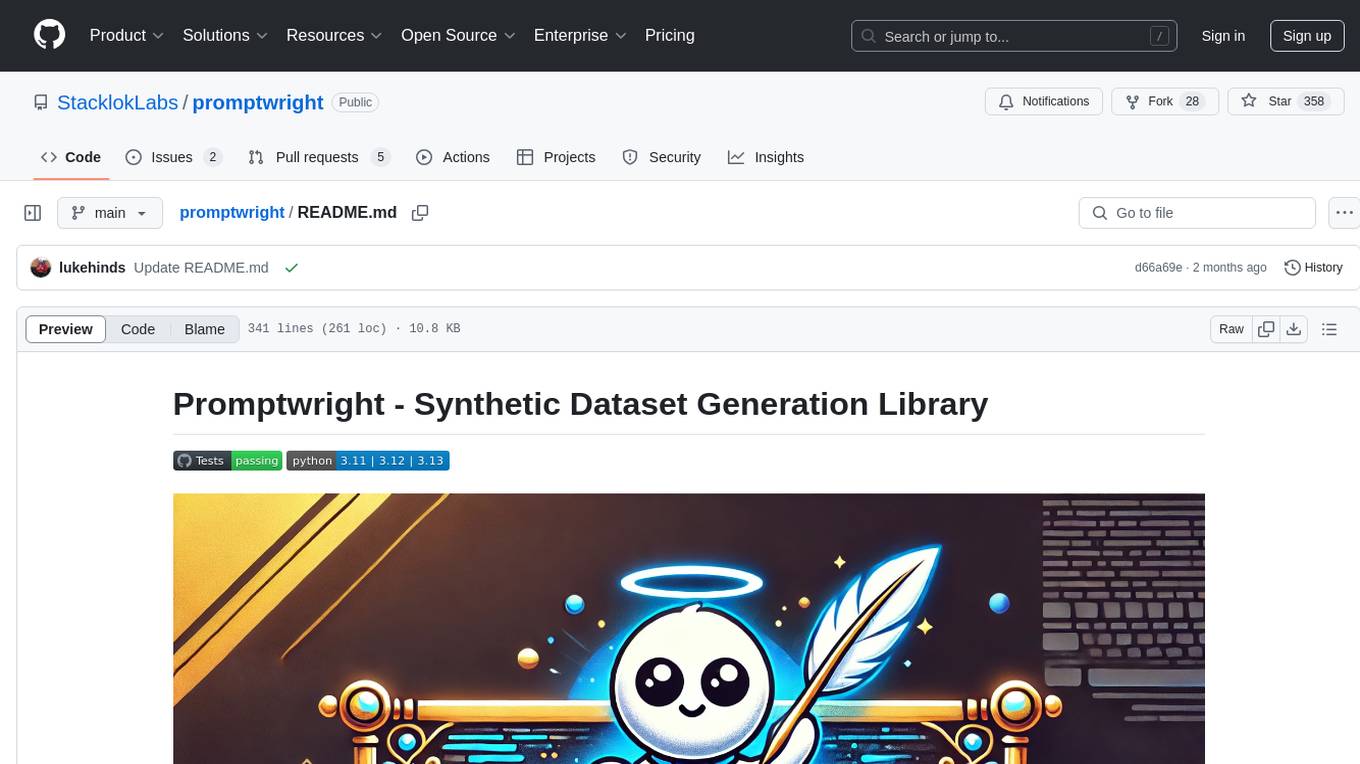
promptwright
Promptwright is a Python library designed for generating large synthetic datasets using a local LLM and various LLM service providers. It offers flexible interfaces for generating prompt-led synthetic datasets. The library supports multiple providers, configurable instructions and prompts, YAML configuration for tasks, command line interface for running tasks, push to Hugging Face Hub for dataset upload, and system message control. Users can define generation tasks using YAML configuration or Python code. Promptwright integrates with LiteLLM to interface with LLM providers and supports automatic dataset upload to Hugging Face Hub.
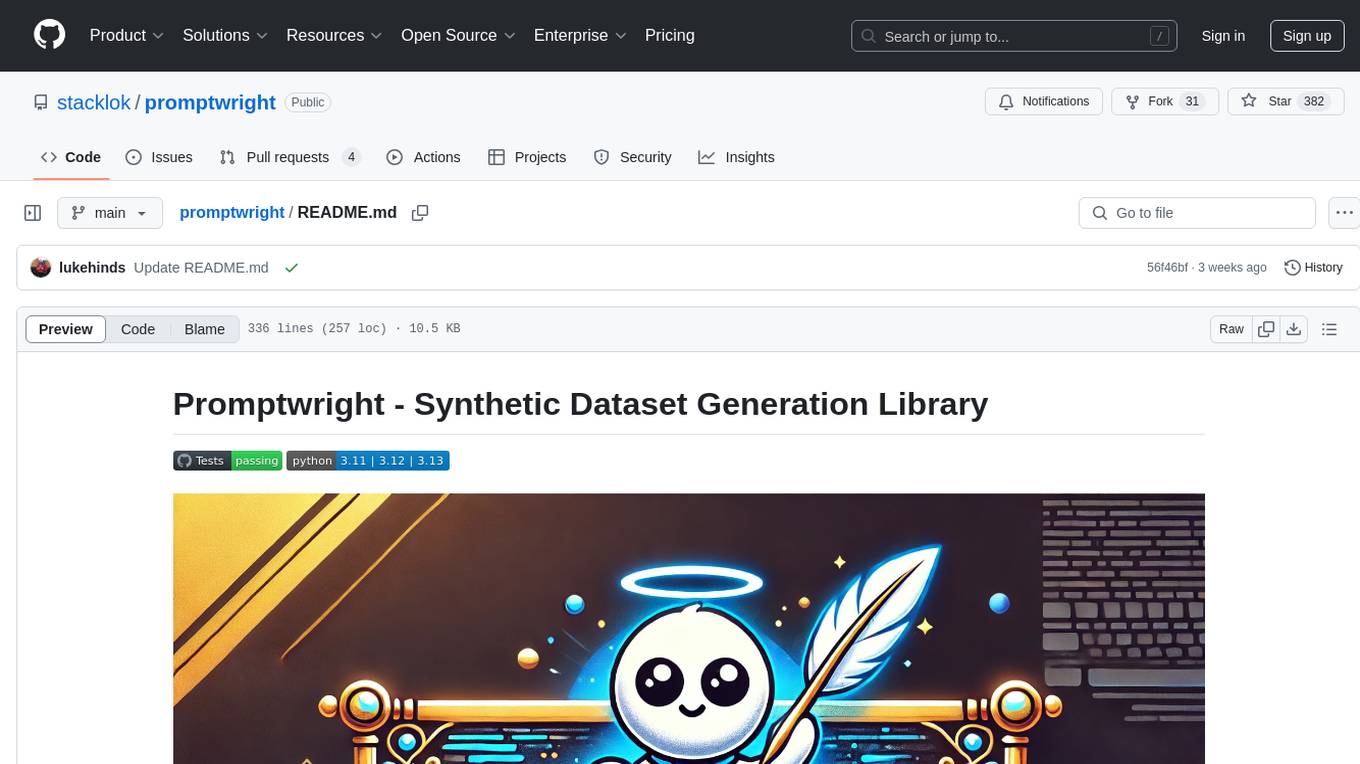
promptwright
Promptwright is a Python library designed for generating large synthetic datasets using local LLM and various LLM service providers. It offers flexible interfaces for generating prompt-led synthetic datasets. The library supports multiple providers, configurable instructions and prompts, YAML configuration, command line interface, push to Hugging Face Hub, and system message control. Users can define generation tasks using YAML configuration files or programmatically using Python code. Promptwright integrates with LiteLLM for LLM providers and supports automatic dataset upload to Hugging Face Hub. The library is not responsible for the content generated by models and advises users to review the data before using it in production environments.
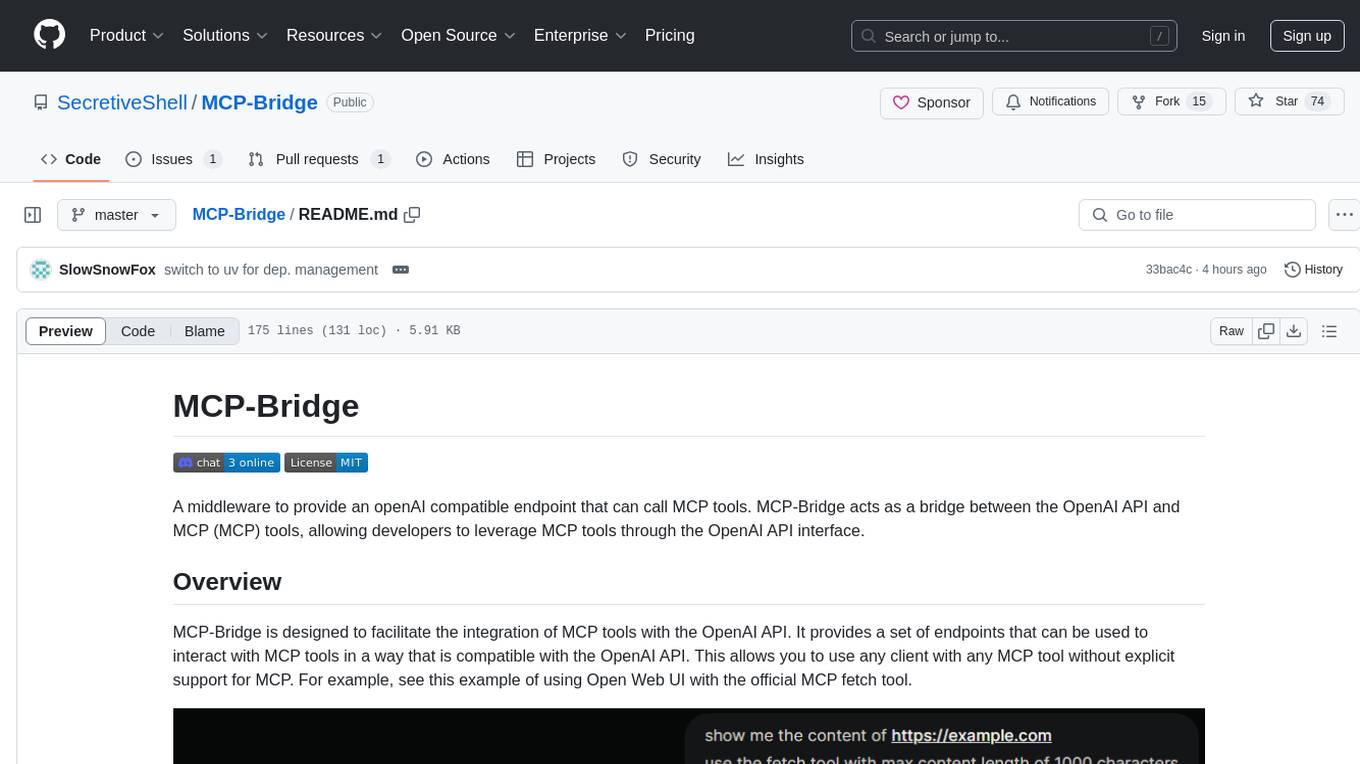
MCP-Bridge
MCP-Bridge is a middleware tool designed to provide an openAI compatible endpoint for calling MCP tools. It acts as a bridge between the OpenAI API and MCP tools, allowing developers to leverage MCP tools through the OpenAI API interface. The tool facilitates the integration of MCP tools with the OpenAI API by providing endpoints for interaction. It supports non-streaming and streaming chat completions with MCP, as well as non-streaming completions without MCP. The tool is designed to work with inference engines that support tool call functionalities, such as vLLM and ollama. Installation can be done using Docker or manually, and the application can be run to interact with the OpenAI API. Configuration involves editing the config.json file to add new MCP servers. Contributions to the tool are welcome under the MIT License.
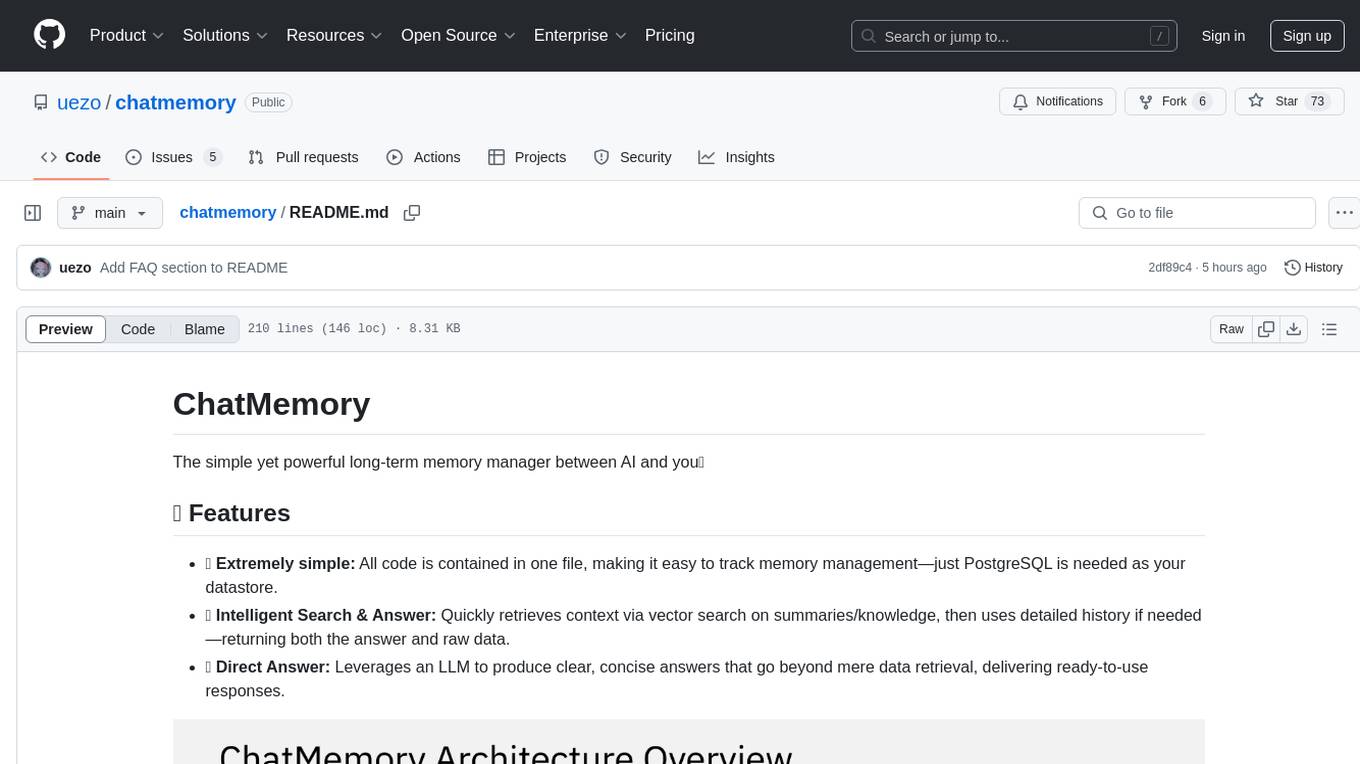
chatmemory
ChatMemory is a simple yet powerful long-term memory manager that facilitates communication between AI and users. It organizes conversation data into history, summary, and knowledge entities, enabling quick retrieval of context and generation of clear, concise answers. The tool leverages vector search on summaries/knowledge and detailed history to provide accurate responses. It balances speed and accuracy by using lightweight retrieval and fallback detailed search mechanisms, ensuring efficient memory management and response generation beyond mere data retrieval.
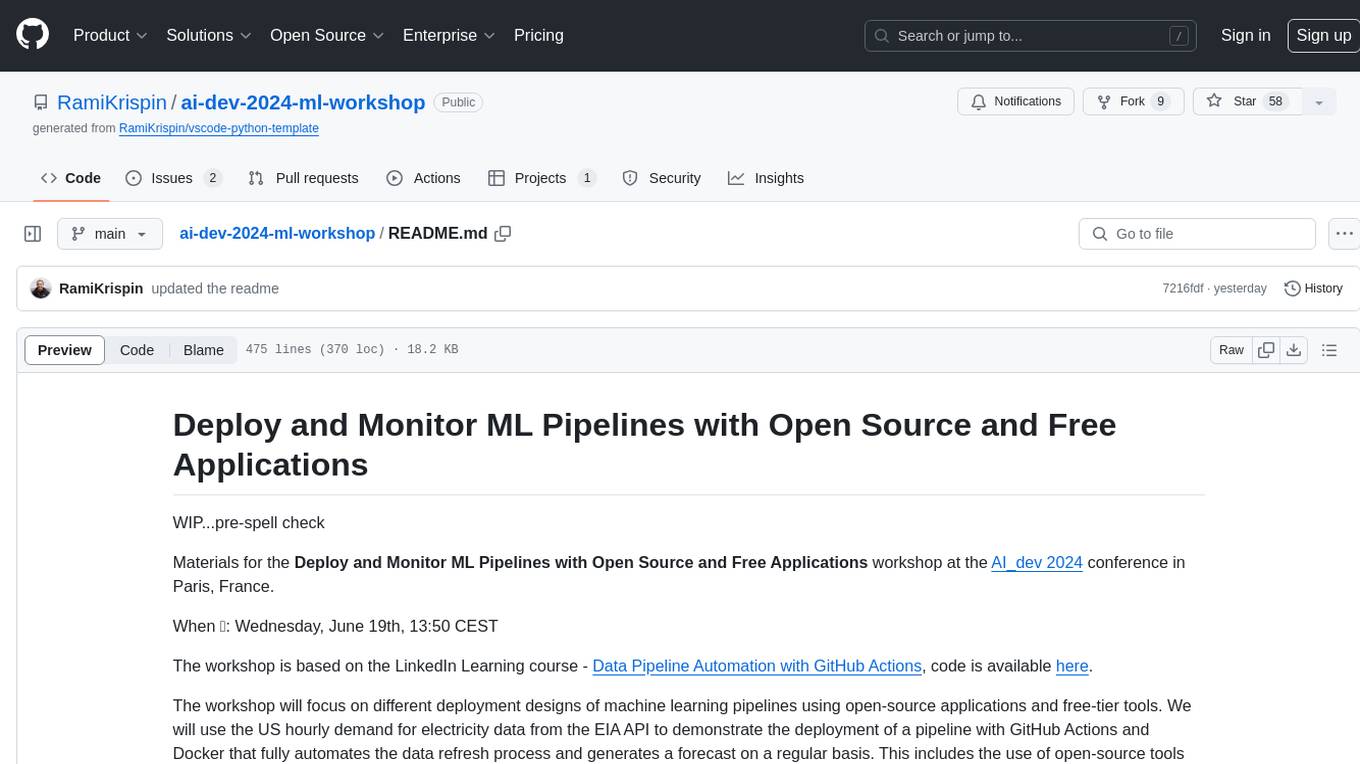
ai-dev-2024-ml-workshop
The 'ai-dev-2024-ml-workshop' repository contains materials for the Deploy and Monitor ML Pipelines workshop at the AI_dev 2024 conference in Paris, focusing on deployment designs of machine learning pipelines using open-source applications and free-tier tools. It demonstrates automating data refresh and forecasting using GitHub Actions and Docker, monitoring with MLflow and YData Profiling, and setting up a monitoring dashboard with Quarto doc on GitHub Pages.
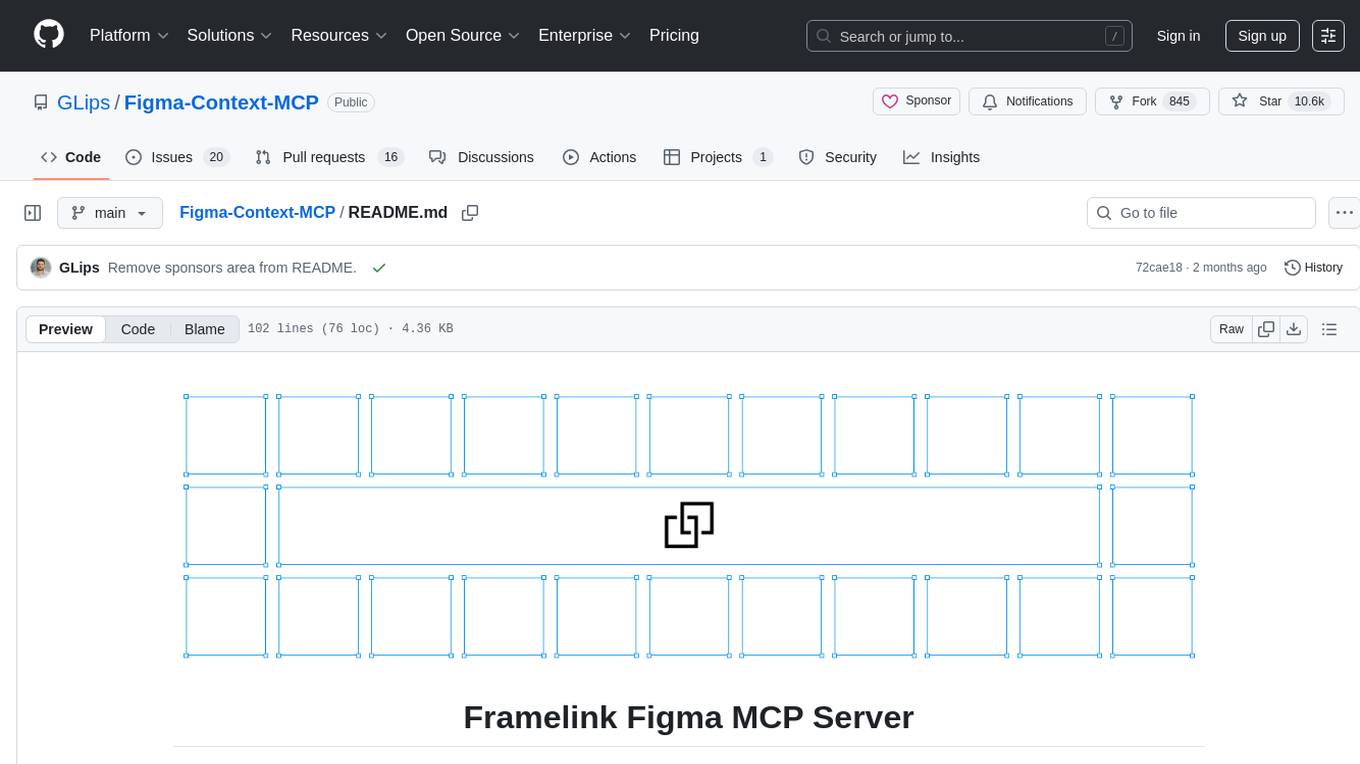
Figma-Context-MCP
Figma-Context-MCP is a plugin for Figma that allows users to easily manage and switch between multiple design contexts within a single Figma file. This tool simplifies the process of working on different design variations or versions by providing a seamless way to organize and switch between them. With Figma-Context-MCP, designers can streamline their workflow and improve collaboration by keeping all design contexts in one place and easily accessible. This plugin enhances productivity and efficiency for Figma users who frequently work on multiple design iterations or versions within a project.
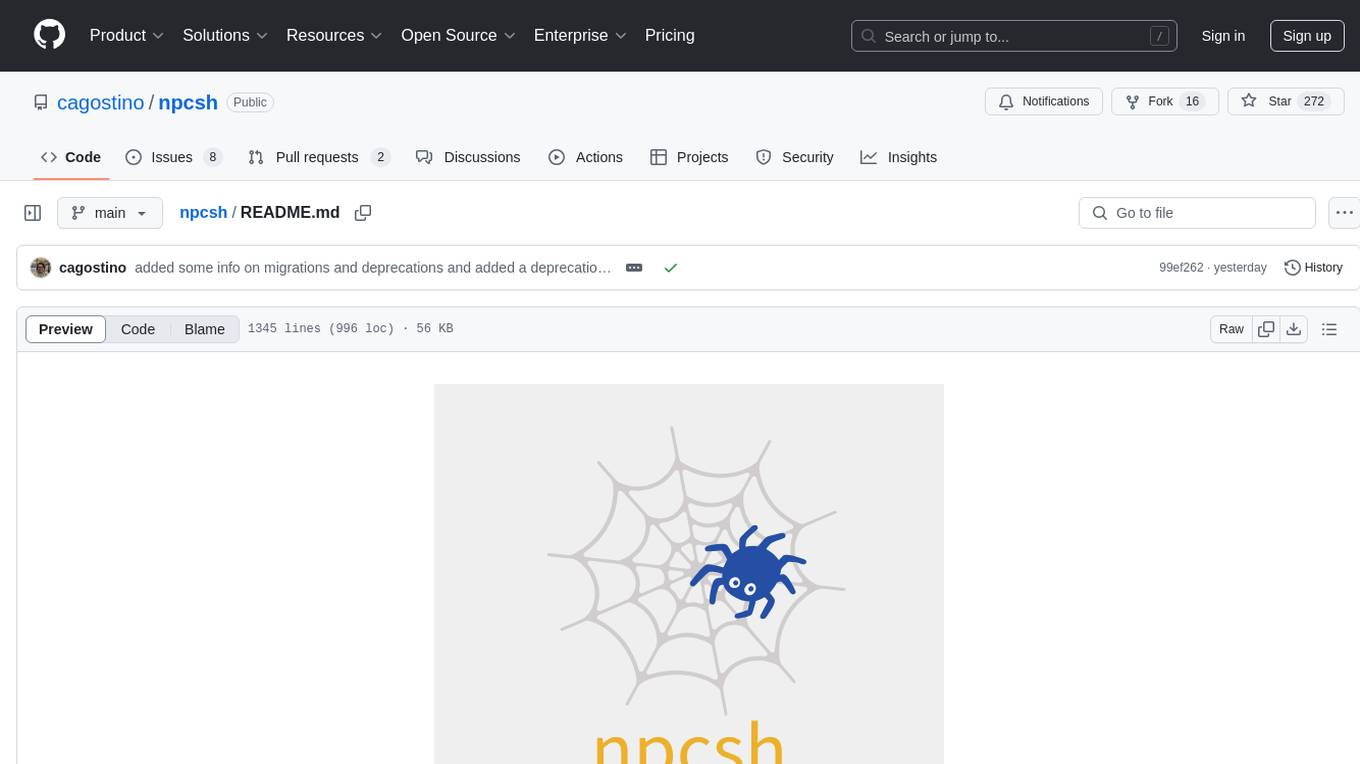
npcsh
`npcsh` is a python-based command-line tool designed to integrate Large Language Models (LLMs) and Agents into one's daily workflow by making them available and easily configurable through the command line shell. It leverages the power of LLMs to understand natural language commands and questions, execute tasks, answer queries, and provide relevant information from local files and the web. Users can also build their own tools and call them like macros from the shell. `npcsh` allows users to take advantage of agents (i.e. NPCs) through a managed system, tailoring NPCs to specific tasks and workflows. The tool is extensible with Python, providing useful functions for interacting with LLMs, including explicit coverage for popular providers like ollama, anthropic, openai, gemini, deepseek, and openai-like providers. Users can set up a flask server to expose their NPC team for use as a backend service, run SQL models defined in their project, execute assembly lines, and verify the integrity of their NPC team's interrelations. Users can execute bash commands directly, use favorite command-line tools like VIM, Emacs, ipython, sqlite3, git, pipe the output of these commands to LLMs, or pass LLM results to bash commands.
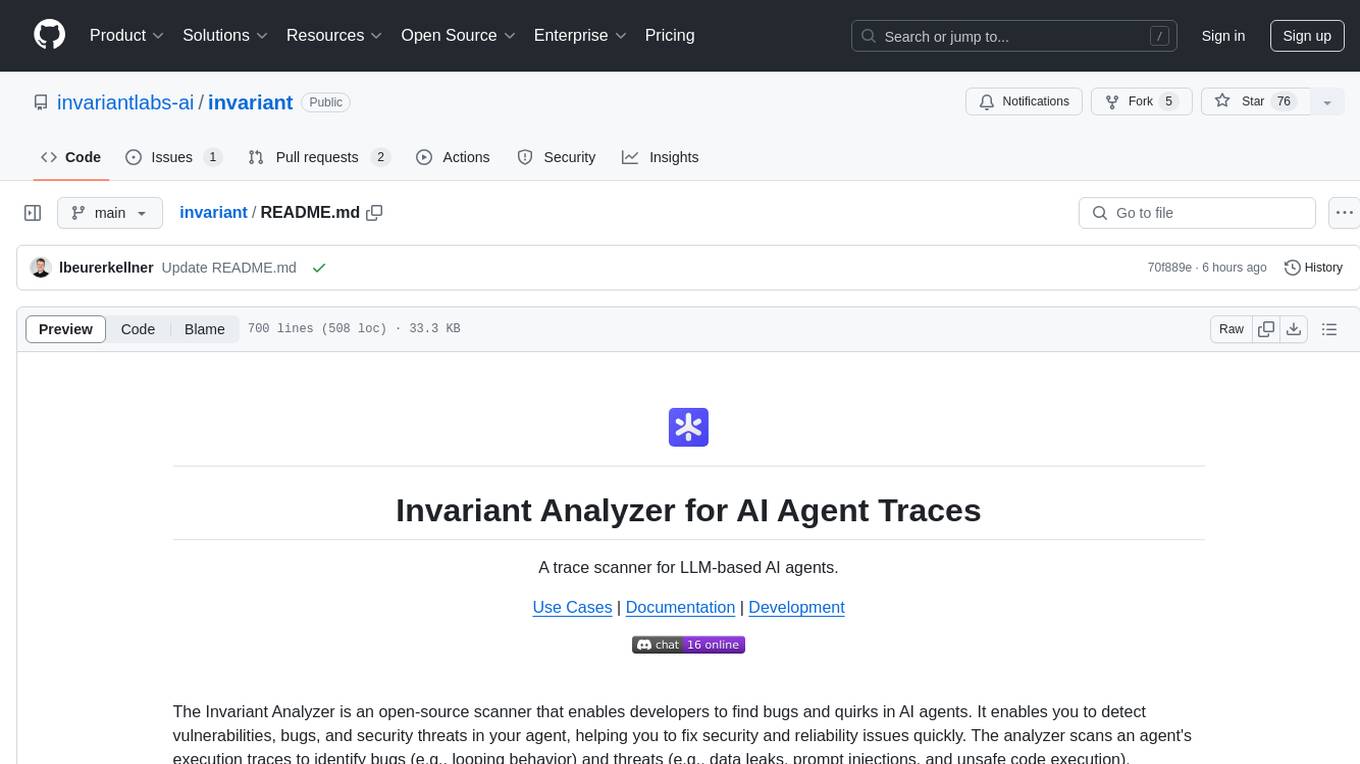
invariant
Invariant Analyzer is an open-source scanner designed for LLM-based AI agents to find bugs, vulnerabilities, and security threats. It scans agent execution traces to identify issues like looping behavior, data leaks, prompt injections, and unsafe code execution. The tool offers a library of built-in checkers, an expressive policy language, data flow analysis, real-time monitoring, and extensible architecture for custom checkers. It helps developers debug AI agents, scan for security violations, and prevent security issues and data breaches during runtime. The analyzer leverages deep contextual understanding and a purpose-built rule matching engine for security policy enforcement.
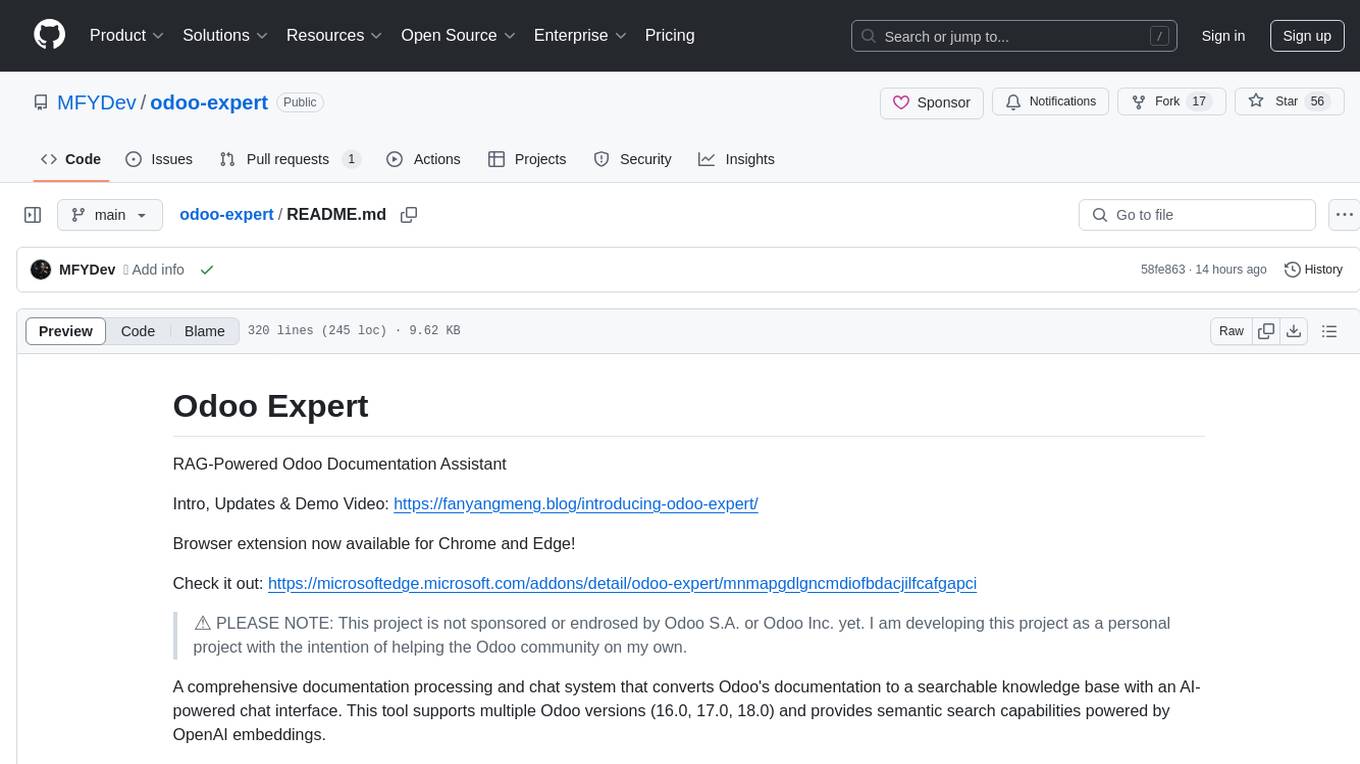
odoo-expert
RAG-Powered Odoo Documentation Assistant is a comprehensive documentation processing and chat system that converts Odoo's documentation to a searchable knowledge base with an AI-powered chat interface. It supports multiple Odoo versions (16.0, 17.0, 18.0) and provides semantic search capabilities powered by OpenAI embeddings. The tool automates the conversion of RST to Markdown, offers real-time semantic search, context-aware AI-powered chat responses, and multi-version support. It includes a Streamlit-based web UI, REST API for programmatic access, and a CLI for document processing and chat. The system operates through a pipeline of data processing steps and an interface layer for UI and API access to the knowledge base.
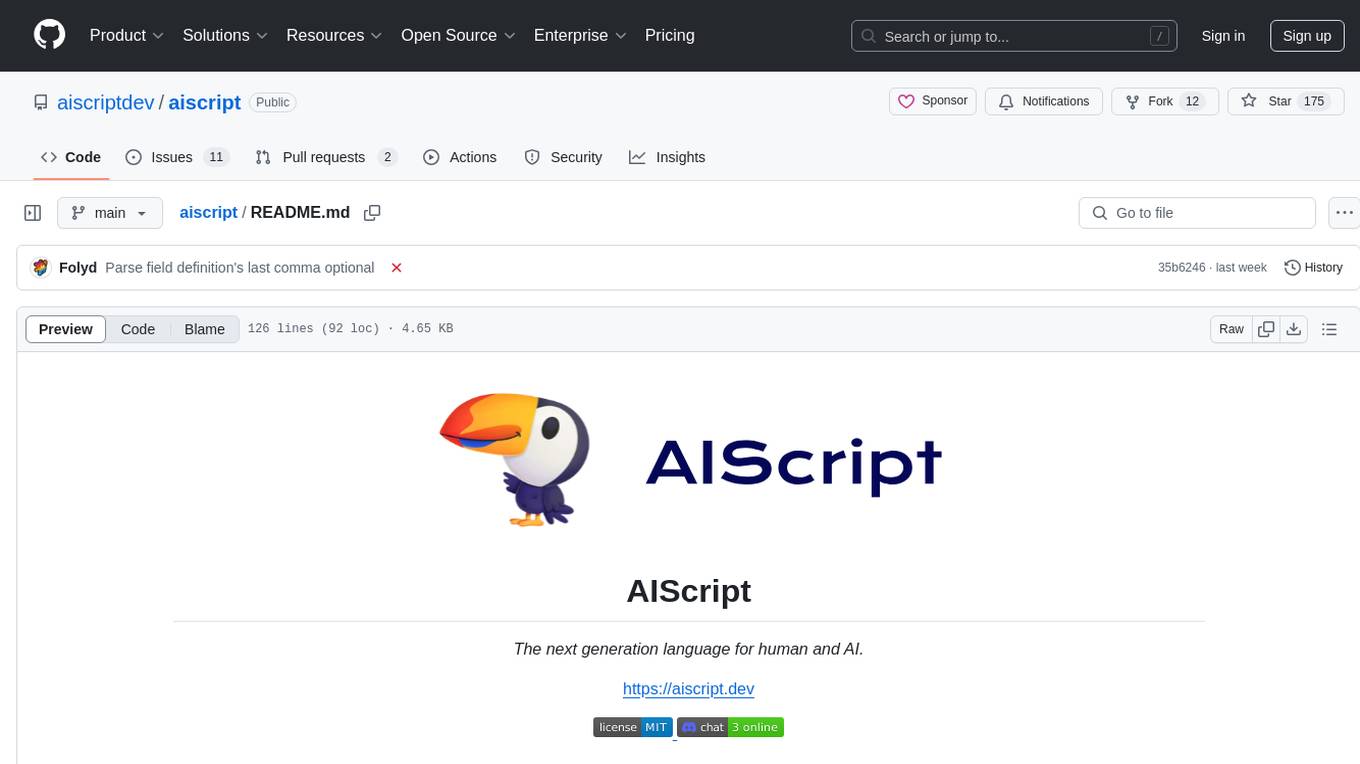
aiscript
AIScript is a unique programming language and web framework written in Rust, designed to help developers effortlessly build AI applications. It combines the strengths of Python, JavaScript, and Rust to create an intuitive, powerful, and easy-to-use tool. The language features first-class functions, built-in AI primitives, dynamic typing with static type checking, data validation, error handling inspired by Rust, a rich standard library, and automatic garbage collection. The web framework offers an elegant route DSL, automatic parameter validation, OpenAPI schema generation, database modules, authentication capabilities, and more. AIScript excels in AI-powered APIs, prototyping, microservices, data validation, and building internal tools.
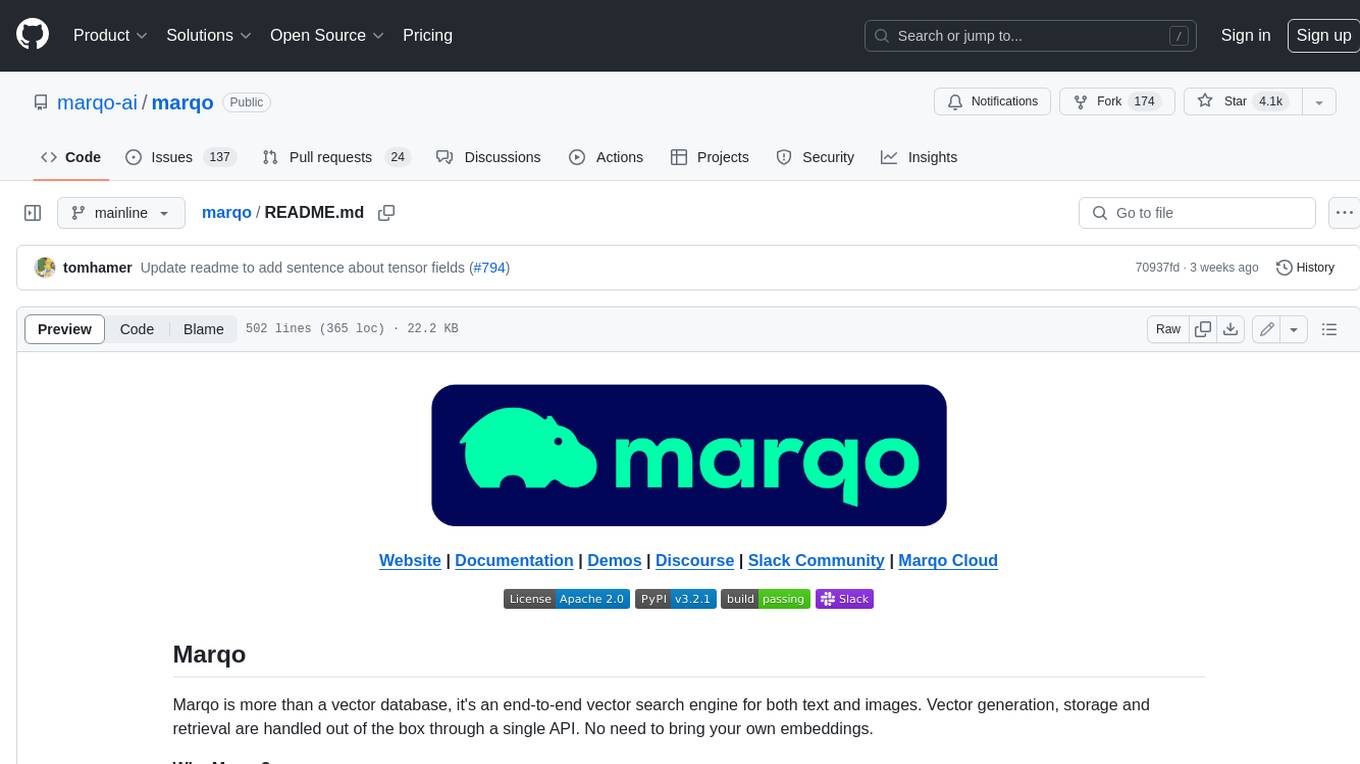
marqo
Marqo is more than a vector database, it's an end-to-end vector search engine for both text and images. Vector generation, storage and retrieval are handled out of the box through a single API. No need to bring your own embeddings.
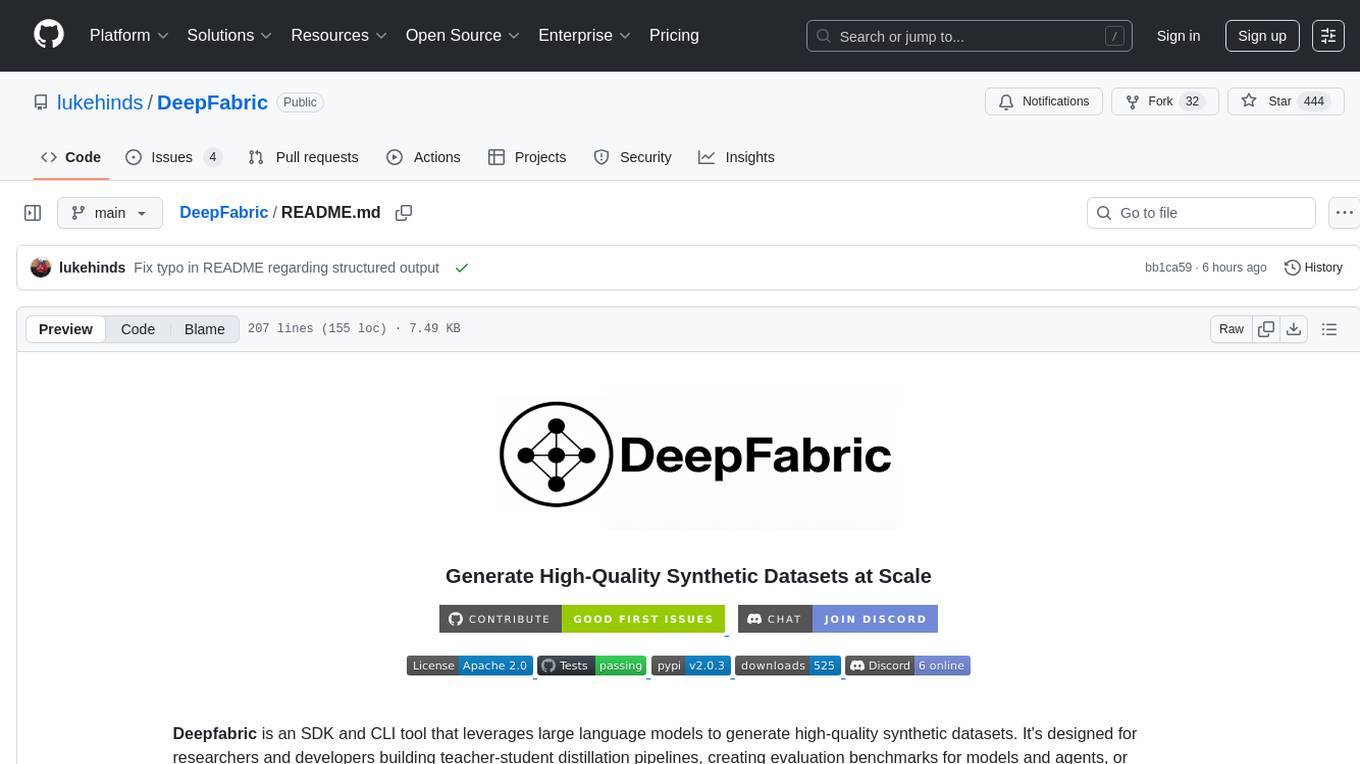
DeepFabric
Deepfabric is an SDK and CLI tool that leverages large language models to generate high-quality synthetic datasets. It's designed for researchers and developers building teacher-student distillation pipelines, creating evaluation benchmarks for models and agents, or conducting research requiring diverse training data. The key innovation lies in Deepfabric's graph and tree-based architecture, which uses structured topic nodes as generation seeds. This approach ensures the creation of datasets that are both highly diverse and domain-specific, while minimizing redundancy and duplication across generated samples.
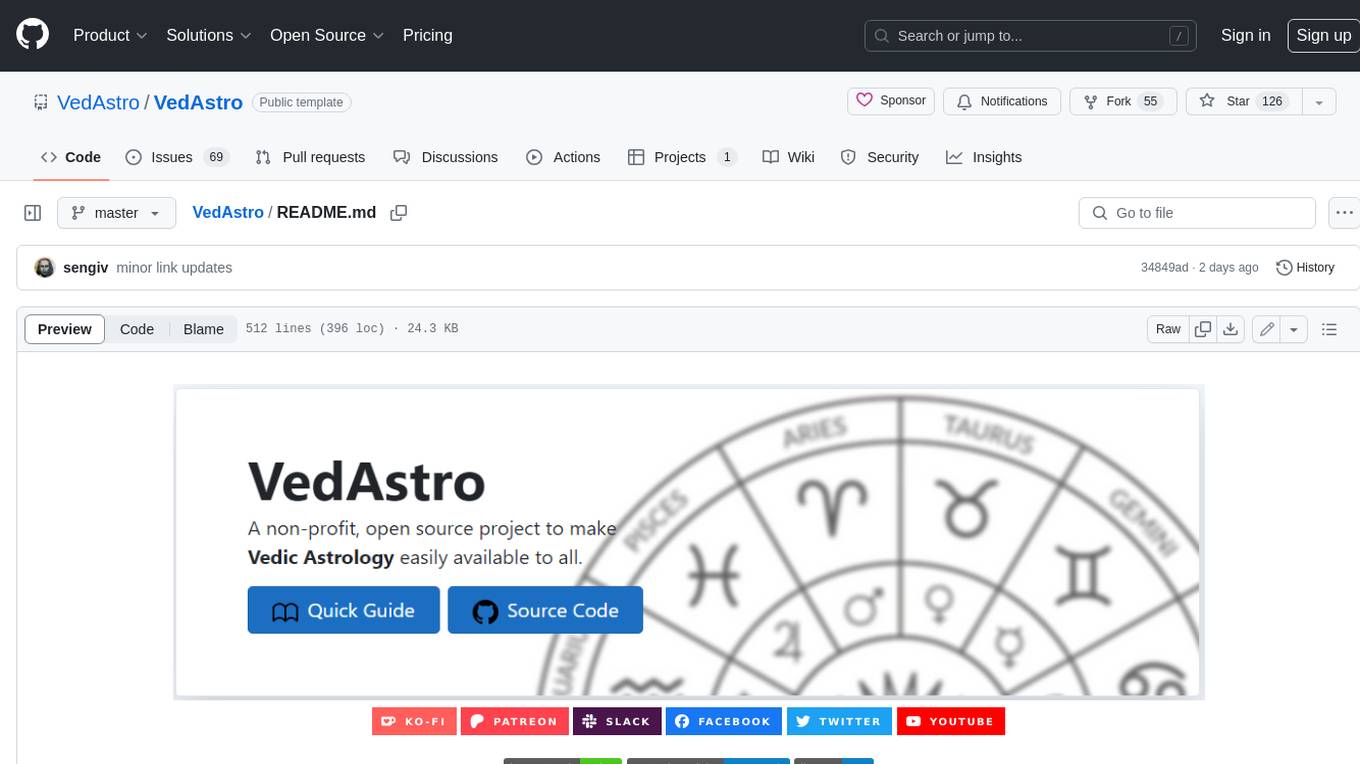
VedAstro
VedAstro is an open-source Vedic astrology tool that provides accurate astrological predictions and data. It offers a user-friendly website, a chat API, an open API, a JavaScript SDK, a Swiss Ephemeris API, and a machine learning table generator. VedAstro is free to use and is constantly being updated with new features and improvements.
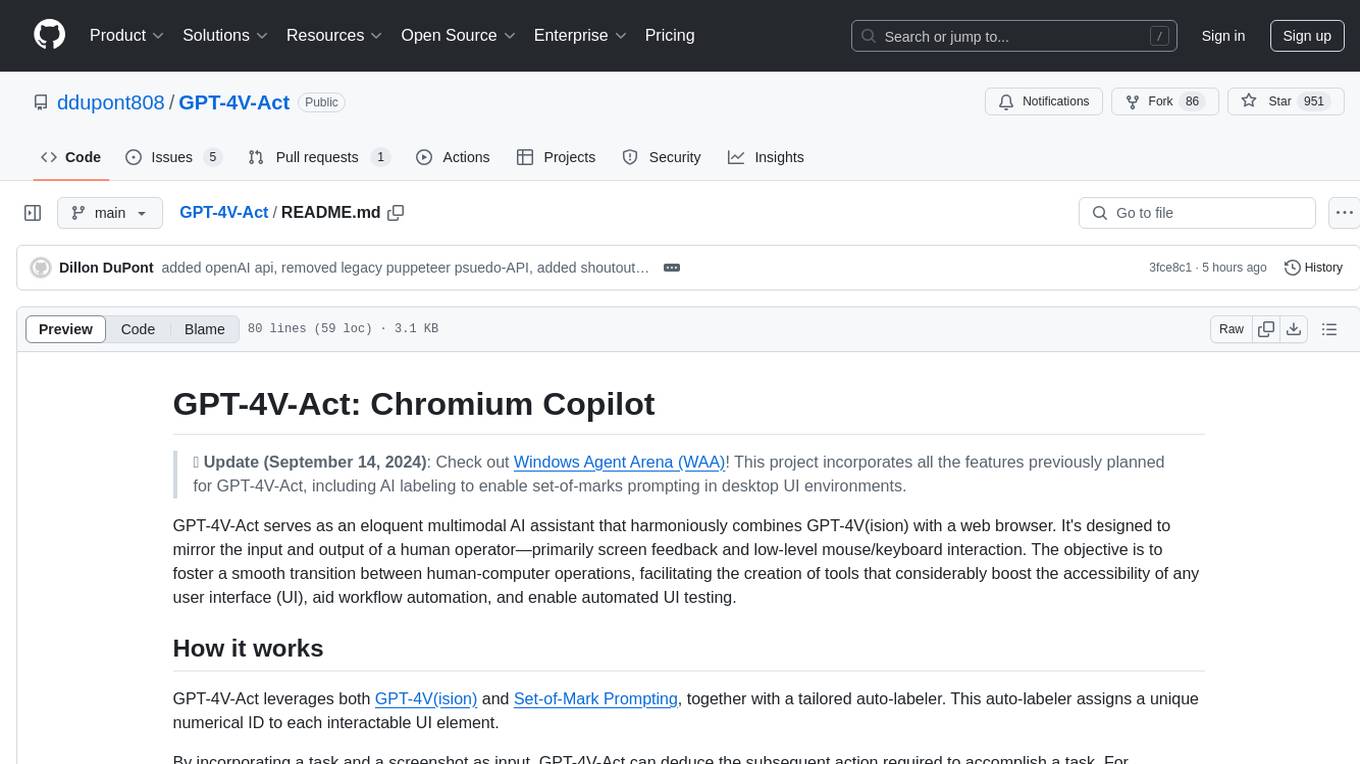
GPT-4V-Act
GPT-4V-Act is a multimodal AI assistant that combines GPT-4V(ision) with a web browser to mirror human operator input and output. It facilitates human-computer operations, boosts UI accessibility, aids workflow automation, and enables automated UI testing through AI labeling and set-of-marks prompting.
For similar tasks

activepieces
Activepieces is an open source replacement for Zapier, designed to be extensible through a type-safe pieces framework written in Typescript. It features a user-friendly Workflow Builder with support for Branches, Loops, and Drag and Drop. Activepieces integrates with Google Sheets, OpenAI, Discord, and RSS, along with 80+ other integrations. The list of supported integrations continues to grow rapidly, thanks to valuable contributions from the community. Activepieces is an open ecosystem; all piece source code is available in the repository, and they are versioned and published directly to npmjs.com upon contributions. If you cannot find a specific piece on the pieces roadmap, please submit a request by visiting the following link: Request Piece Alternatively, if you are a developer, you can quickly build your own piece using our TypeScript framework. For guidance, please refer to the following guide: Contributor's Guide
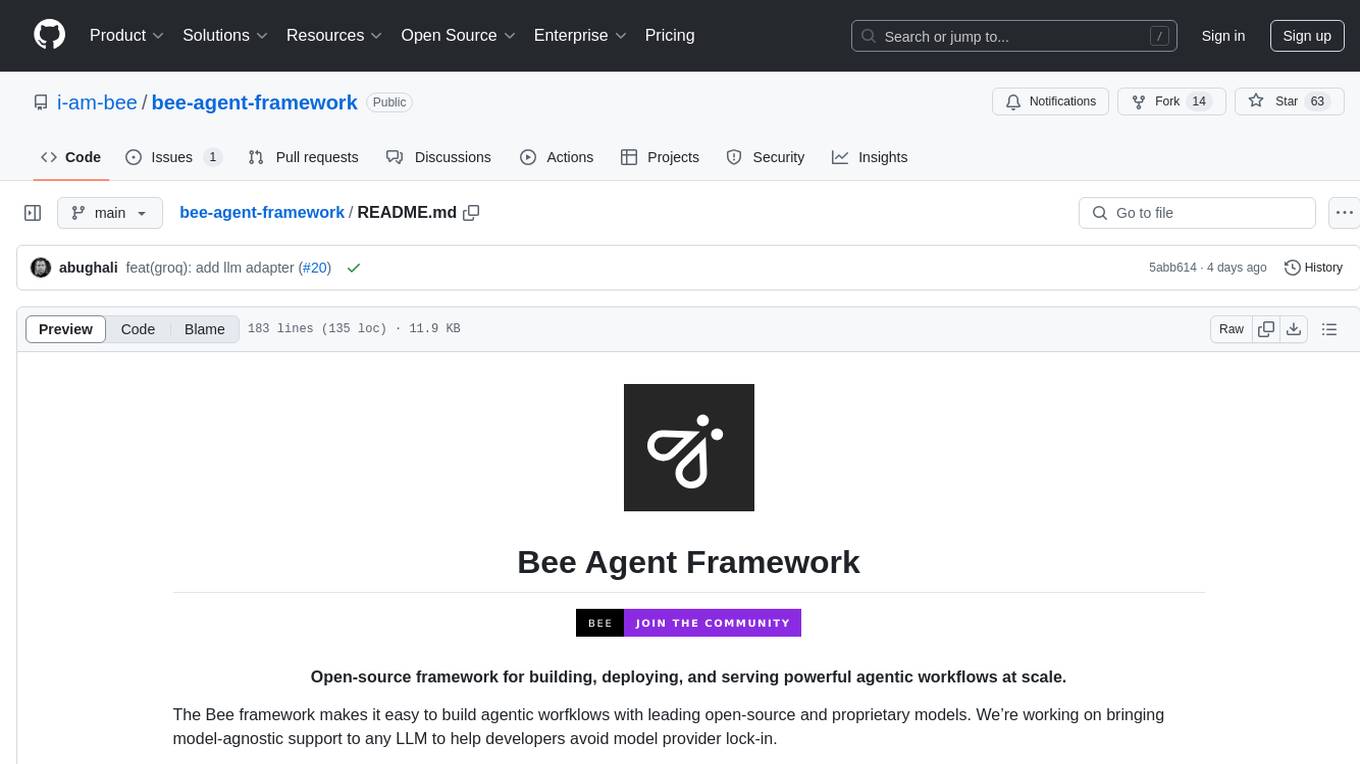
bee-agent-framework
The Bee Agent Framework is an open-source tool for building, deploying, and serving powerful agentic workflows at scale. It provides AI agents, tools for creating workflows in Javascript/Python, a code interpreter, memory optimization strategies, serialization for pausing/resuming workflows, traceability features, production-level control, and upcoming features like model-agnostic support and a chat UI. The framework offers various modules for agents, llms, memory, tools, caching, errors, adapters, logging, serialization, and more, with a roadmap including MLFlow integration, JSON support, structured outputs, chat client, base agent improvements, guardrails, and evaluation.

mastra
Mastra is an opinionated Typescript framework designed to help users quickly build AI applications and features. It provides primitives such as workflows, agents, RAG, integrations, syncs, and evals. Users can run Mastra locally or deploy it to a serverless cloud. The framework supports various LLM providers, offers tools for building language models, workflows, and accessing knowledge bases. It includes features like durable graph-based state machines, retrieval-augmented generation, integrations, syncs, and automated tests for evaluating LLM outputs.

otto-m8
otto-m8 is a flowchart based automation platform designed to run deep learning workloads with minimal to no code. It provides a user-friendly interface to spin up a wide range of AI models, including traditional deep learning models and large language models. The tool deploys Docker containers of workflows as APIs for integration with existing workflows, building AI chatbots, or standalone applications. Otto-m8 operates on an Input, Process, Output paradigm, simplifying the process of running AI models into a flowchart-like UI.
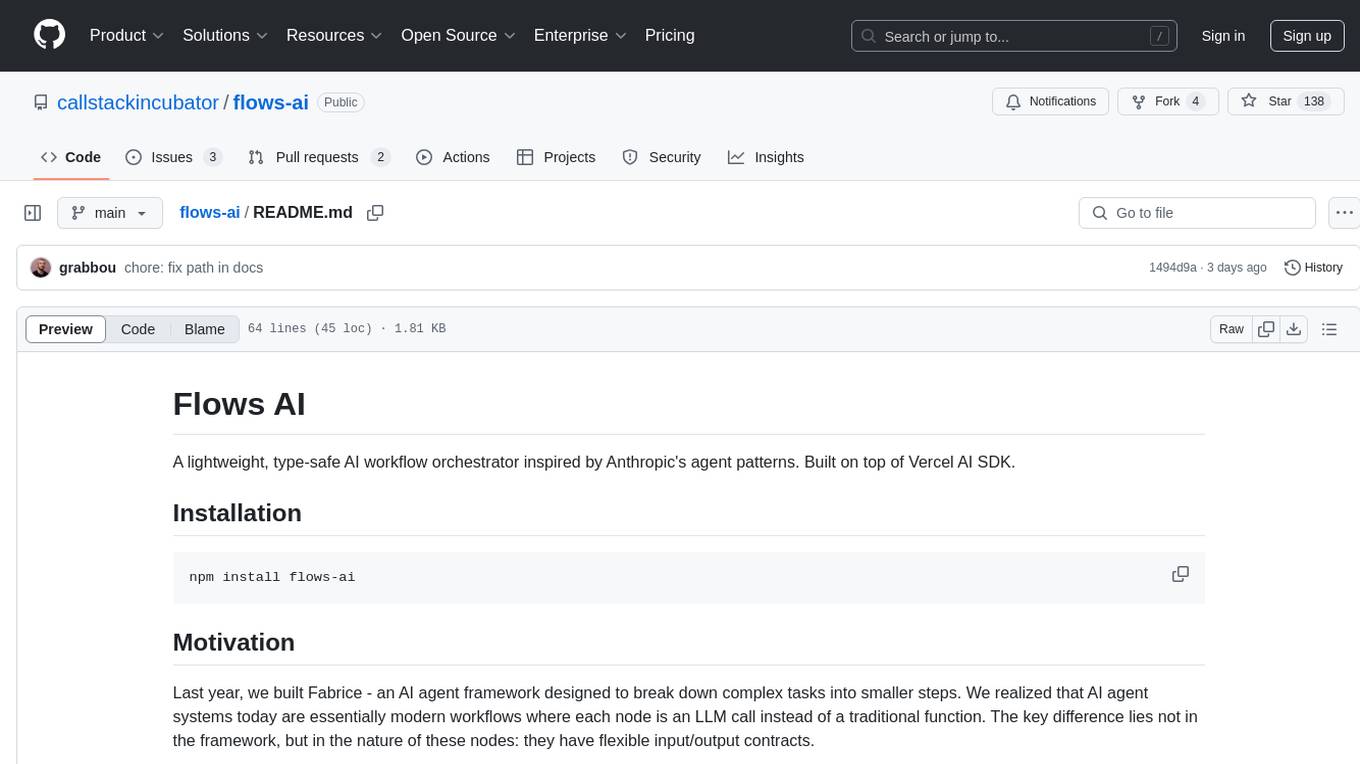
flows-ai
Flows AI is a lightweight, type-safe AI workflow orchestrator inspired by Anthropic's agent patterns and built on top of Vercel AI SDK. It provides a simple and deterministic way to build AI workflows by connecting different input/outputs together, either explicitly defining workflows or dynamically breaking down complex tasks using an orchestrator agent. The library is designed without classes or state, focusing on flexible input/output contracts for nodes.
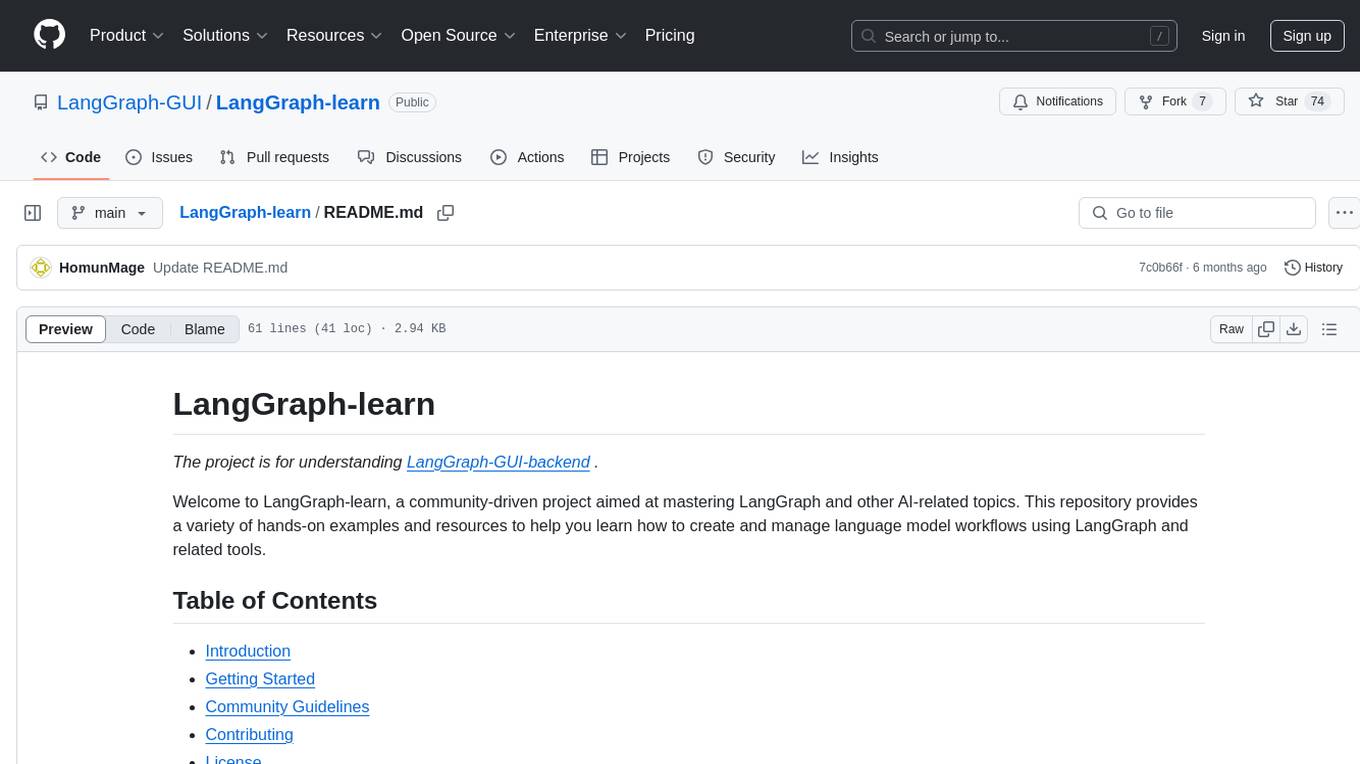
LangGraph-learn
LangGraph-learn is a community-driven project focused on mastering LangGraph and other AI-related topics. It provides hands-on examples and resources to help users learn how to create and manage language model workflows using LangGraph and related tools. The project aims to foster a collaborative learning environment for individuals interested in AI and machine learning by offering practical examples and tutorials on building efficient and reusable workflows involving language models.
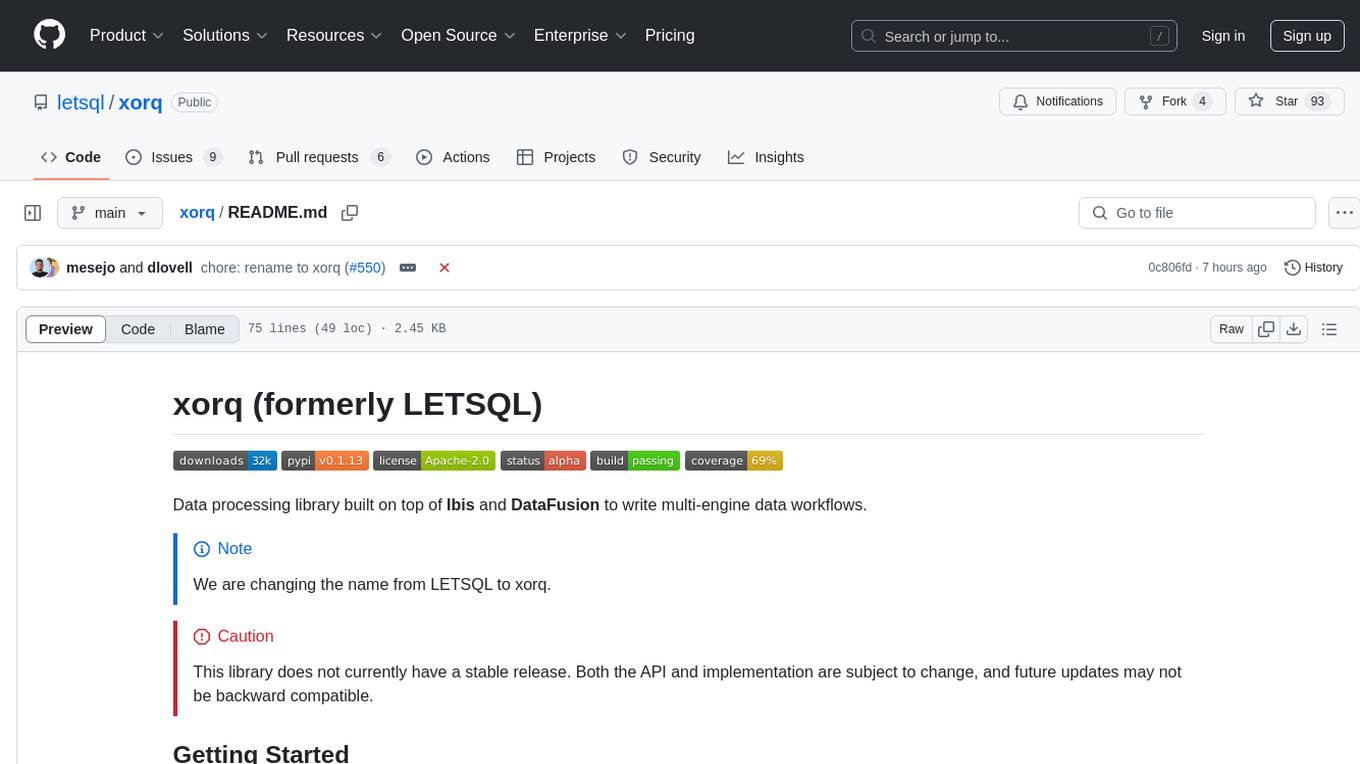
xorq
Xorq (formerly LETSQL) is a data processing library built on top of Ibis and DataFusion to write multi-engine data workflows. It provides a flexible and powerful tool for processing and analyzing data from various sources, enabling users to create complex data pipelines and perform advanced data transformations.
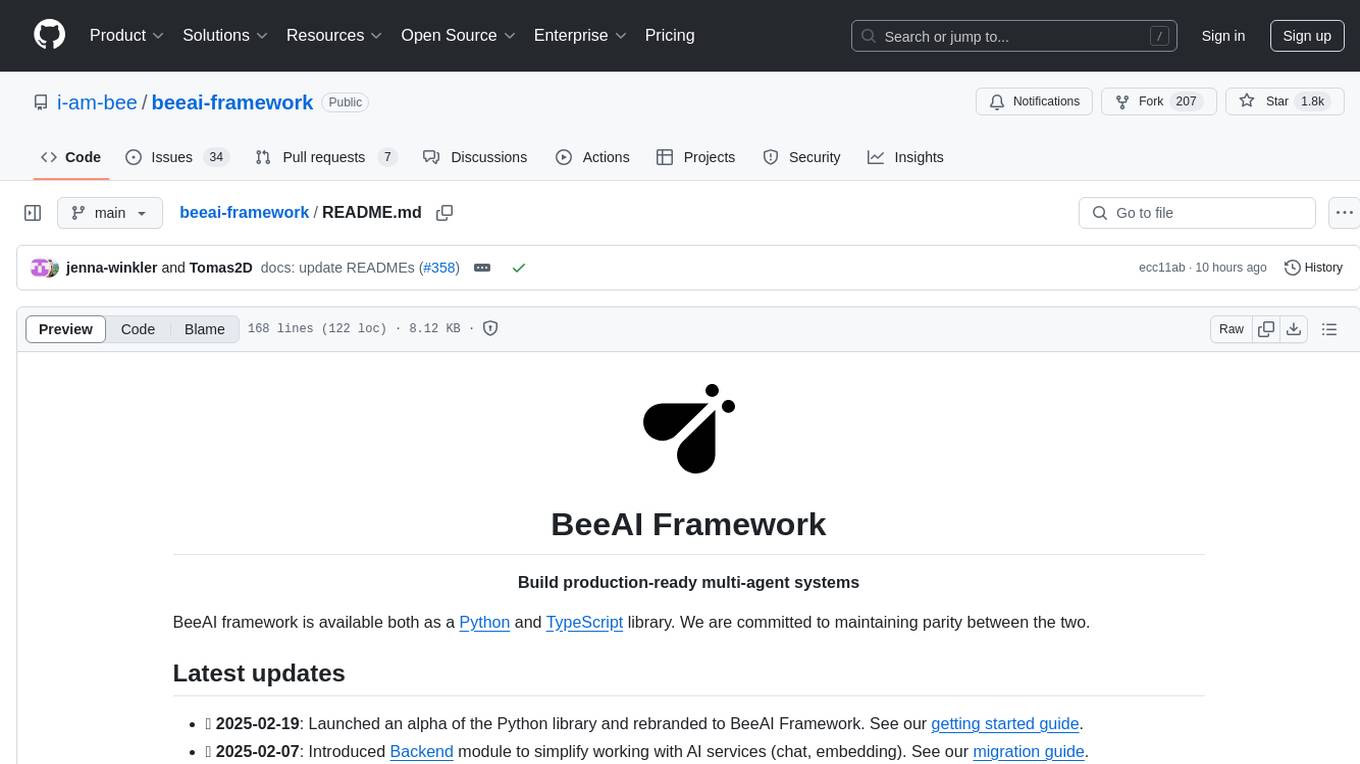
beeai-framework
BeeAI Framework is a versatile tool for building production-ready multi-agent systems. It offers flexibility in orchestrating agents, seamless integration with various models and tools, and production-grade controls for scaling. The framework supports Python and TypeScript libraries, enabling users to implement simple to complex multi-agent patterns, connect with AI services, and optimize token usage and resource management.
For similar jobs

weave
Weave is a toolkit for developing Generative AI applications, built by Weights & Biases. With Weave, you can log and debug language model inputs, outputs, and traces; build rigorous, apples-to-apples evaluations for language model use cases; and organize all the information generated across the LLM workflow, from experimentation to evaluations to production. Weave aims to bring rigor, best-practices, and composability to the inherently experimental process of developing Generative AI software, without introducing cognitive overhead.

LLMStack
LLMStack is a no-code platform for building generative AI agents, workflows, and chatbots. It allows users to connect their own data, internal tools, and GPT-powered models without any coding experience. LLMStack can be deployed to the cloud or on-premise and can be accessed via HTTP API or triggered from Slack or Discord.

VisionCraft
The VisionCraft API is a free API for using over 100 different AI models. From images to sound.

kaito
Kaito is an operator that automates the AI/ML inference model deployment in a Kubernetes cluster. It manages large model files using container images, avoids tuning deployment parameters to fit GPU hardware by providing preset configurations, auto-provisions GPU nodes based on model requirements, and hosts large model images in the public Microsoft Container Registry (MCR) if the license allows. Using Kaito, the workflow of onboarding large AI inference models in Kubernetes is largely simplified.

PyRIT
PyRIT is an open access automation framework designed to empower security professionals and ML engineers to red team foundation models and their applications. It automates AI Red Teaming tasks to allow operators to focus on more complicated and time-consuming tasks and can also identify security harms such as misuse (e.g., malware generation, jailbreaking), and privacy harms (e.g., identity theft). The goal is to allow researchers to have a baseline of how well their model and entire inference pipeline is doing against different harm categories and to be able to compare that baseline to future iterations of their model. This allows them to have empirical data on how well their model is doing today, and detect any degradation of performance based on future improvements.

tabby
Tabby is a self-hosted AI coding assistant, offering an open-source and on-premises alternative to GitHub Copilot. It boasts several key features: * Self-contained, with no need for a DBMS or cloud service. * OpenAPI interface, easy to integrate with existing infrastructure (e.g Cloud IDE). * Supports consumer-grade GPUs.

spear
SPEAR (Simulator for Photorealistic Embodied AI Research) is a powerful tool for training embodied agents. It features 300 unique virtual indoor environments with 2,566 unique rooms and 17,234 unique objects that can be manipulated individually. Each environment is designed by a professional artist and features detailed geometry, photorealistic materials, and a unique floor plan and object layout. SPEAR is implemented as Unreal Engine assets and provides an OpenAI Gym interface for interacting with the environments via Python.

Magick
Magick is a groundbreaking visual AIDE (Artificial Intelligence Development Environment) for no-code data pipelines and multimodal agents. Magick can connect to other services and comes with nodes and templates well-suited for intelligent agents, chatbots, complex reasoning systems and realistic characters.
